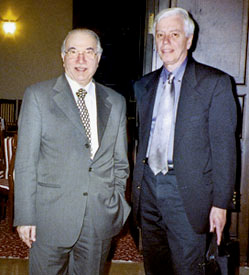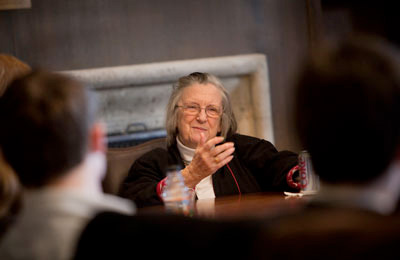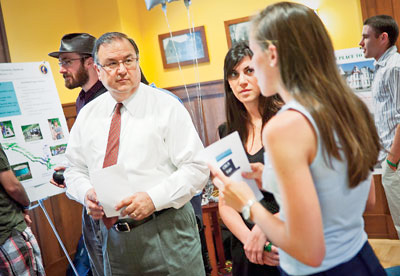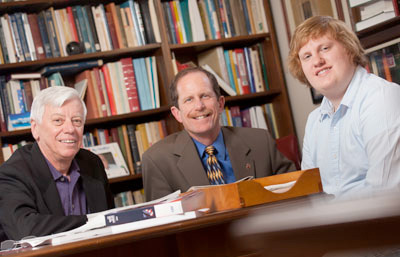The Meyner Center’s Broad Impact
by Geiff Gehman ’80

IRAQ: John Kincaid (right) with Madhat al-Mahmood, chief justice of Iraq
A Nobel Prize winner. A new police chief. Former residents of a low-income housing complex. Public officials in a capitalist/Communist city. Hundreds of academics and practitioners worldwide, committed to healthier relationships among national, regional, and local governments.
All these individuals were united in 2010 by the Robert B. and Helen S. Meyner Center for the Study of State and Local Government. It was another busy year for a rare small-college brain trust that works with government officials nationally and internationally, recruits local municipal managers, and trains students in the frustrating, rewarding work of public works.
The Meyner Center opened in 1994 with funds from the late Robert B. Meyner ’30, who served as New Jersey’s governor from 1954 to 1962, and his late wife, Helen Stevenson Meyner, who represented New Jersey in the U.S. House of Representatives from 1975 to 1979. At its center is founding director John Kincaid, Meyner Professor of Government and Public Service, a prominent authority on federalism, intergovernmental relations, and state and local governments. During his 16 years on College Hill, he’s made the Meyner Center an international forum on federalist approaches to ethnolinguistic accommodation, economic development, human rights, government innovation, and civic compromises.
NOBEL LAUREATE VISITS
In January, Kincaid returned to the People’s Republic of China, which he first visited in 1973. He was the only active college professor in a nine-member delegation sponsored by the Woodrow Wilson Center’s Kissinger Institute on China and the United States. He surveyed phenomenal growth in Shenzhen, a booming metropolis of shipping, high-tech industry, and foreign investments. Over the past three decades, the population of this former fishing village has rocketed to more than eight million. Traffic jams caused by bicycles have been replaced by the congestion that comes with 1,000 new cars registered every day. Designated China’s first special economic zone, the city is now a capital of capitalism.

CAMPUS: Nobel Laureate Elinor Ostrom
Kincaid met with city officials there. He also spoke about U.S. federalism along with the U.S. ambassador to China, Jon Huntsman, former governor of Utah, at a symposium in Sanya, Hainan, China’s Waikiki. The event was hosted by the Counselors’ Office, a body consisting of retired senior officials who advise the Premier’s State Council.
Last year, Kincaid also brought the world to his courses on American government, state and local government, and federalism. International guests discussed local government in Japan, the high court in Australia, and federal features of the European Union. The most distinguished guest was Elinor Ostrom, co-winner of the 2009 Nobel Prize in Economic Sciences and a longtime colleague of Kincaid’s. In a visit co-sponsored by the Policy Studies Program, the Department of Geology and Environmental Geosciences, and the Mellon Foundation, Ostrom discussed her specialty — the governance of “common pool” resources, such as forests, fisheries, oil fields, grazing lands, and irrigation systems — with small groups of students and faculty from several disciplines. Her public lecture in Colton Chapel drew more than 500 people.
Ostrom impressed Charles Prutzman ’11, who assists Kincaid with research and is the master architect of the Meyner Center’s developing web site. The government and law/psychology major was captivated by the Nobel winner’s ambition, vision, and decency. “It’s an honor to be with someone so esteemed, so accessible, and so kind,” he says. “It’s inspiring. It makes you want to reach that level of esteem.”
Prutzman kept the web site humming with reports of the center director’s travels. In March, Kincaid attended a Tijuana symposium on strengthening security along the U.S.-Mexico border. Some Mexican municipalities, he indicates, forbad police officers to take guns home. The restriction makes cops even more powerless against drug lords with superior weapons and forces. These kingpins function as unofficial government officials, using their phenomenal profits to fund roads, schools, and other public projects too expensive for cash-starved municipalities.
Kincaid proposes bolstering Mexican police forces with better pay and better training. He also suggests extending policing powers for municipalities and improving cooperation between Mexico’s states and their localities. Binational cooperation might be improved by adapting successful models from the Canada-U.S. border, such as integrated border enforcement and security task forces and the Shiprider Program, in which American and Canadian officials ride on each other’s boats on the border’s waterways. Greater geographic latitude gives authorities of both countries greater legal latitude when, for example, they pursue alleged drug dealers speedboating across Lake Ontario.
The Meyner Center works as well with state officials and with national organizations of state and local officials in the United States. Kincaid writes the state-federal relations chapter for the annual Book of the States issued by the Council of State Governments. The center also is advising the Pennsylvania Local Government Commission on its study of the fiscal impact of state mandates on local governments.
IN EASTON AND THE REGION
In June, the Meyner Center hosted its eighth annual forum on local government. It was keynoted by Michael Nutter, the dynamic mayor of Philadelphia, who discussed how his city has developed innovative programs in education and public safety while combating severe poverty and severe budget cuts. More than 100 municipal leaders also shared other strategies, such as how to decrease utility bills through green designs and increase income through cell-phone towers.

EASTON: Mayor Sal Panto Jr.
The forum marked a whirlwind year for David Woglom ’78, the center’s associate director for public service. He came to the center in 2007 after 20 years of managing Quakertown, Pa., where he supervised more than 100 employees, a $20 million-plus budget, and borough-owned water, sewage, and power services. At the Meyner Center, he’s used his political and psychological skills to aid municipalities, especially those that are understaffed and underfunded but eager to improve governance and administration.
Last year, Woglom helped Pen Argyl, Pa., in Northampton County, hire a police chief. He smoothly coordinated everything from following state regulations to meeting deadlines, reports borough manager Robin Zmoda. “Dave kept us on track and in focus,” she says. “He took a huge burden off us. He’s very easy to get along with while being businesslike, and that’s a hard line to walk. Plus, he’s got a wonderful, dry sense of humor.”
South Whitehall Township, in Lehigh County, recruited Woglom to recruit a manager. Woglom was asked to fill a big hole in a hurry. South Whitehall’s previous manager had retired suddenly after 22 years. The township’s five commissioners had never recruited a manager. There were no legitimate successors within the township. And there was no budget for a search.
Woglom supplied superior one-stop services, says South Whitehall commissioner Howard Ellsworth, who knew Woglom from attending Meyner Center events. According to Ellsworth, Woglom provided excellent advice on advertising the opening and excellent questions for candidates. Assisted by Woglom, South Whitehall hired a manager in under three months, pretty much a municipal miracle.
For three years, Woglom has been part of ongoing efforts to stabilize and revitalize Easton, Lafayette’s closest municipal partner. In 2007, he undertook a comprehensive study of the city’s operations, which included reviewing the implementation status of recommendations for improving operations that had been set forth the previous year by consultants under the auspices of Pennsylvania’s Early Intervention Program. (EIP is aimed at preventing struggling municipalities from declaring bankruptcy.) His work helped Easton stave off remediation under the state’s Financially Distressed Municipalities Act.
In 2009, Woglom helped Easton hire a city administrator for its new form of government, in which the mayor doubles as president of city council. He also has facilitated retreats that helped the mayor, business administrator, and members of city council enhance communications and pinpoint areas for improvement.
“Dave is a good listener and a good facilitator,” says Easton Mayor Sal Panto Jr. “He has a way of allowing employees to trust him. If they say something out of line, they know it won’t get back to management. It’s the way to get the real truth, not something that’s antiseptic.”
Under an agreement negotiated by Kincaid, the Meyner Center is currently providing an in-depth four-year evaluation of the redevelopment of a public housing complex in South Easton. Funded by a $20 million federal HOPE VI grant, the Housing Authority of Easton demolished the 250 dwelling units in the increasingly derelict and dangerous Delaware Terrace/Annex neighborhood, necessitating relocation of residents in the summer and fall of 2008. Since then, 96 rental units, including family housing and “senior cottages,” have been built in the redeveloped complex, called Neston Heights. Plans also call for construction of 48 low-income homes to be offered for sale.

CHINA: Shehzhen
In addition to Kincaid and Woglom, the Meyner Center’s project team includes Jamila Bookwala, associate professor of psychology, who specializes in social relationships, stress, and health during the middle and late adulthood years; Mark Crain, Simon Professor of Political Economy, who specializes in econometrics, public finance, and public policy; David Shulman, associate professor of anthropology and sociology, who specializes in quantitative and qualitative research methodology and organizational analysis; and now also James DeVault, associate professor of economics, who specializes in environmental economics.
Under their direction, Lafayette students interviewed nearly 100 former Delaware Terrace residents; some heads of household were reached only after dozens of phone calls. Molly Lieber ’09 discovered a community that had been divided by drugs and violence but united by roomy buildings and friendly neighbors. Lauren Buisson ’10 discovered concerns about the slow construction of Neston Heights and about residency requirements that weren’t tough enough.
This summer, Lafayette students will interview the first residents of Neston Heights. The evaluation team will use the information to determine whether residents achieve federal objectives for self-sufficiency. “The goal is to make sure that the new residents are good residents,” says Panto.
The Delaware/Neston project fulfills many missions. It widens the Lafayette-Easton partnership. It strengthens Lafayette’s dedication to community outreach, service learning, and global citizenship. It provides students with a host of practical and philosophical benefits. Lieber expects that interviewing strangers about quality-of-life issues will help her immeasurably in her master’s program in social work and public health.
Neston/Delaware dovetails with Woglom’s other duties. He plays a key role in an association of municipalities that administer their own electricity-distribution systems and provides advice and administrative services to a new Northampton County agency, consisting of 38 municipalities and 8 school districts, created to collect earned-income taxes in the county. On campus, he helps Career Services conduct mock job interviews with Lafayette students and serves on the Committee on Community-Based Learning and Research. Woglom enjoys helping undergraduates learn how to interview for the right jobs; he really enjoys helping municipalities find good leaders.
INTERNATIONAL OUTREACH
Kincaid is a leading academic ambassador for the Global Dialogue on Federalism, a multi-year, multi-million dollar project originally proposed by the Meyner Center. A network of 3,000-plus members, it is sponsored by the Forum of Federations and the International Association of Centers for Federal Studies. Kincaid has lectured on federalism from Australia to India, from Ukraine to Egypt. At Lafayette, he helped launch a summer institute for young federalism scholars; in Iraq he helped launch a multi-institutional center for federal studies. From 1981 to 2006, he edited Publius, the world’s leading journal devoted to federalism. He is senior editor of the Global Dialogue book series, which has generated seven volumes to date.

ETHIOPIA: Addis Ababa
In September, Kincaid was in Philadelphia for an international conference on federalism and the global financial crisis that drew scholars from around the world. Research was presented on Argentina, Australia, Canada, the European Union, Germany, India, Italy, Nigeria, South Africa, Spain, Switzerland, and the United States. The conference was organized and hosted by the Meyner Center and the Center for State Constitutional Studies at Rutgers University, Camden. In 2009, Kincaid wrote an analytic introduction to the first translation of The Federalist into the Catalan language, which had been banned in Spain during the fascist Franco regime. Last June, he lectured at two international forums in Spain.
Kincaid concluded his own whirlwind year by serving as a rapporteur during a December conference in Ethiopia, hosted by its prime minister. More than 600 participants, including heads of state and other representatives from most African countries, discussed strengths and weaknesses of federalism as a mode of governance for diverse societies.
“Ethiopia is a fascinating new federation of nations, nationalities, and peoples,” Kincaid says, explaining that the federal system was established following the 1991 overthrow of the brutal Marxist-Leninist regime of Mengistu Haile Mariam. It contains nine ethnolinguistically based states, two self-governing city administrations, 83 official languages, and one federal working language.
“If it works, Ethiopia’s federalism could be a model for the many African countries having comparable diversity,” Kincaid says. “But the true test of the model’s value will come when opposition parties can win elections against the monopolistic Ethiopian People’s Revolutionary Democratic Front and the country can hold together when opposition parties control some of the states. A genuine federal democracy would be a huge achievement in Africa.”
CAMPUS SERVICE
Prutzman and Jason Pang ’10 are two of Kincaid’s EXCEL Scholars. Last year, they learned about American debates over decentralizing education and health care while analyzing references to federalism in documents from the George W. Bush presidency. While reviewing chapters submitted to the Kincaid-edited series of federalism books, they discovered the tricky politics of editing the English of non-English academics.
Kincaid is “a brilliant teacher and organizer,” says Pang, a government and law/philosophy graduate who is studying law at UCLA. “He taught me so much about structuring points of view and tackling issues from all angles.”

John Kincaid (L-R), David Woglom ’78, and Charles Prutzman ’11.
“It’s a privilege to be around his perspective,” says Prutzman of Kincaid. “He has 100 projects going at once, all of them immensely important to the field. I really admire his pride, and his enjoyment, in the quality of his work. He’s proof that if you pursue something with passion, you can become truly influential in whatever endeavor you end up in.”
Last year, the Meyner Center even influenced the Lafayette administration, arguably its most surprising client. In February, Woglom completed an eight-month administrative study and overtime analysis of Plant Operations, a department of 100-plus employees who maintain everything from heating to mowing, planting to tenting. “We needed to improve our customer service,” says Mitchell Wein, vice president for finance and administration. “We needed to answer the question: ‘How are we doing?’”
A year later, Woglom’s study is changing the college climate. Students, teachers, and administrators are now told they can save money by meeting in a room with chairs rather than hiring Plant Ops to place chairs in an empty room. There’s an easier phone number to call if a hallway needs cleaning or a tree needs trimming. The College’s biggest division is becoming a better system of government.